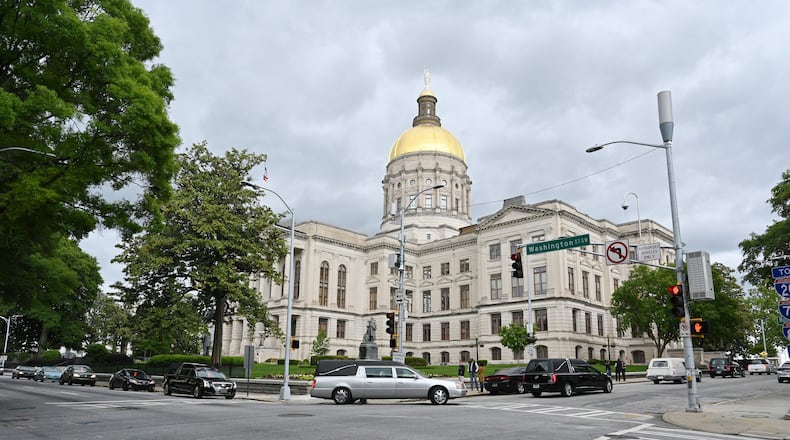For Gov. Brian Kemp, the cost of fighting the coronavirus pandemic became too steep to pay.
So on Thursday, hoping to revitalize a reeling economy, Kemp lifted a shelter-at-home mandate for most Georgians, ending the state's most ambitious attempt to slow the virus' spread.
However, Kemp ordered elderly and medically fragile residents to stay home until at least mid-June. And he urged all Georgians to take responsibility for protecting themselves.
Kemp disregarded the objections of many public health experts and the federal Centers for Disease Control and Prevention. One of the last governors to impose a lockdown as the outbreak worsened, Kemp now leads the way for restarting business activity, even as the human toll from the virus continues to rise.
In an interview with The Atlanta Journal-Constitution, Kemp said the time had come to focus on economic recovery. He contended that, with increased testing and ample hospital beds, Georgia is ready to handle a surge in coronavirus cases, should it occur.
“What we’ve done has worked,” Kemp said. “It’s given us time to build our hospital infrastructure capacity, get ventilators and ramp up testing. That’s what really drove our decision.”
Kemp said the virus has been worse for elderly Georgians than for younger, relatively healthy residents. About one in five confirmed coronavirus diagnoses and more than two in five deaths are linked to nursing homes and other long-term care facilities.
“I felt like the negative effects of not having our economy starting to open up was beginning to have the same weight as the virus itself, especially if you weren’t in the medically fragile category or someone in a long-term care facility,” Kemp said. “For most of the rest of Georgia, the effect has been minimal.”
Even before Kemp acted, signs pointed to increased commercial activity on Friday: malls, major retailers such as Macy's, and others planned to open their doors for the first time in weeks.
But to many public health experts, Kemp placed too much emphasis on the tension between containing the virus and boosting the economy.
“We need to remind ourselves this is a public health crisis,” said Dr. Carlos del Rio, executive associate dean for Emory University at Grady Memorial Hospital, speaking during a Facebook Live event. “In order to rescue the economy, we need healthy people.”
COMPLETE COVERAGE: CORONAVIRUS IN GEORGIA
Dr. Keren Landman, an epidemiologist and infectious disease specialist from Atlanta, wrote an opinion piece in The New York Times on Thursday suggesting Kemp was "setting us up for a punishing new wave of infections."
In an interview, Landman said that while the economic pain is real for many Georgians, Kemp and other leaders are too occupied with short-term problems, rather than the extended period during which the global pandemic is likely to continue.
“There’s nothing we’re seeing that suggests to me we’re anywhere near to being out of the woods,” she said.
A CDC study published this week called for continuing social-distancing measures in Georgia to protect not only those considered most vulnerable to infection, but also people who are relatively young and healthy.
When the shelter-at-home order went into effect on April 3, Georgia had recorded slightly fewer than 6,000 cases of COVID-19, the disease caused by the new coronavirus. Deaths totaled 198.
As the order expired, more than 26,000 Georgians had contracted the virus. As of Thursday evening, 1,132 had died.
The state’s economic casualties also have been staggering. Nearly 1.4 million Georgians applied for unemployment benefits in the past six weeks — more than one-fifth of the workforce. Publicly traded companies warned of steep second-quarter losses, and many small businesses shut their doors, at least temporarily.
An executive order that Kemp signed Thursday allows the vast majority of businesses to operate if they follow social distancing and sanitation guidelines that will be in effect through May 13. Bars, nightclubs, live performance venues and public pools remain closed.
Kemp extended a public health state of emergency until June 12, and even without a shelter-at-home mandate in effect for most Georgians, he urged residents to stay in “whenever possible.”
He also extended a ban on stricter measures imposed by local governments, a provision that has stirred deep resentment in many officials.
“At this point, it’s probably more a personal decision to make as to whether to venture out,” Fulton County Commission Chairman Robb Pitts said.
Lifting the lockdown, while also preventing local regulations, “makes the challenge at the local level exponentially more difficult than what it was,” said DeKalb County Chief Executive Officer Michael Thurmond. “Sheltering in place is by far the most successful and effective prevention strategy.”
On MSNBC, Atlanta Mayor Keisha Lance Bottoms called Kemp’s action “very disappointing.” She added, “This could be catastrophic.”
In the interview with the Journal-Constitution, Kemp said such criticism “comes with the territory.” If local officials want to enforce social distancing, he said, they can cite violators of his executive orders.
Kemp’s public health commissioner, Dr. Kathleen Toomey, downplayed the effects of ending the shelter-in-place restriction, which followed last week’s reopening of close-contact businesses such as barber shops, nail salons and tattoo parlors.
“It isn’t as if a switch has been flipped and everything has opened,” Toomey said. “This isn’t saying: Go forth and congregate in large groups. It’s: Go forth and continue to take those precautions.”
Kemp said getting Georgians back to work is as important as containing the coronavirus.
“We’re running two races,” he said. “The first is defeating coronavirus. We’re farther down the road in that race. Now we have the race to start rebuilding our economy. It’s going to be a long road, I believe, but we’re taking measured steps to doing that.”
But Kemp hasn’t rushed out to newly reopened businesses himself. He hasn’t eaten in a restaurant since he allowed them to resume dine-in service. And when he needed a haircut, he let one of his daughters handle the barbering.
Keep Reading
The Latest
Featured








